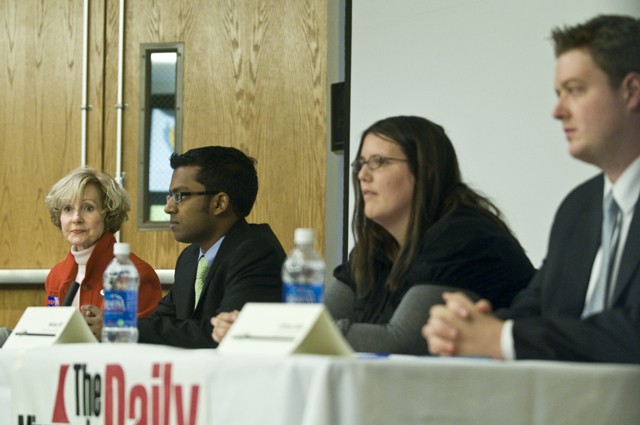Candidates for Minneapolis City Council Ward 3 âÄî DFLers Diane Hofstede and Allen Kathir , Republican Jeffrey Cobia and Melissa Hill , who is running without a party endorsement but under the âÄúCivil DisobedienceâÄù brand âÄî sparred at the second of the Minnesota DailyâÄôs city council debates Thursday night. Citing issues including affordable housing, budget control, neighborhood advocacy and instant runoff voting, the candidates said MinneapolisâÄô Ward 3 requires community involvement to combat many of the problems facing the city. Incumbent DFL candidate HofstedeâÄôs years as Ward 3 councilmember were criticized as largely unproductive by her opposition. Cobia, a University Law School alumnus and first-time candidate, said the gaps between MinneapolisâÄô neighborhoods havenâÄôt improved since 2005, when Hofstede was elected. âÄúThere is a gap between Northeast neighborhoods and Southwest Minneapolis,âÄù he said. âÄúAnd itâÄôs growing.âÄù Cobia said voter participation through active communication is necessary to âÄúbridge the gap.âÄù Kathir, a University alumnus, said students must become more active in city elections because the issues affect everyone. âÄúIf we want students to stop treating this neighborhood like a hotel room, we need to make sure they have a voice in it,âÄù he said. âÄúA councilmember should represent everyone in [the Ward], not just certain associations.âÄù Hofstede said she has worked to integrate the WardâÄôs varying communities. âÄúIâÄôve walked the streets of North Minneapolis and [seen the changes that need to be made].âÄù Hofstede said she is very proud of her record and her many accomplishments as councilmember, including crime reduction âÄî Minneapolis is at a 20-year low in crime âÄî and neighborhood involvement through ward summits. âÄúNobody knows the ward like I do. I have a vision to improve the future of this city and have made great strides in that,âÄù Hofstede said. âÄúNeighborhood associations are critical to the city,âÄù she said. âÄúThey are primary to keeping [Minneapolis] functional.âÄù Instant runoff voting became a hot topic when Hofstede said it was an experiment for the state. Kathir said Minneapolis shouldnâÄôt have to wait nearly eight weeks, as has been predicted by state officials, to process votes as it has in the past. âÄúWe can send someone to the moon in a week âĦ it shouldnâÄôt take two months to figure out who won the election,âÄù he said. The candidates agreed that IRV education is essential in their campaigns. âÄúAs candidates, we must be sure the voters know how the system works,âÄù Hill said. Cobia said the counting process is more complicated under MinneapolisâÄô new voting process, stressing the need to count every vote tallied. âÄúThe most important thing is that all the votes get counted,âÄù he said. âÄú[Minnesota] canâÄôt afford a debacle [such as the last yearâÄôs U.S. Senate contest] âĦ IRV voting shouldnâÄôt deter voters from coming out on Election Day.âÄù Hill said decentralization and openness in government are primary issues in her campaign. âÄúDecentralization is important to this election,âÄù she said. âÄúEach [neighborhood] knows whatâÄôs best for it.âÄù Hill said she doesnâÄôt have hopes of winning the election, but she wants a stronger civilian presence in local government. âÄúMy campaign lets people know there are other options,âÄù she said. The candidates said the Nov. 3 election is a reminder that local government is meant to represent its citizens. âÄúAlthough city government elections donâÄôt have the glamour of a [statewide or presidential election] they enable change and development within the city,âÄù Cobia said. Kathir said it is important for students to understand the issues and vote in the upcoming election. âÄúI challenge students to prove their presence in the Ward and vote,âÄù he said. âÄúThese issues affect the city and its citizens dually.âÄù

















